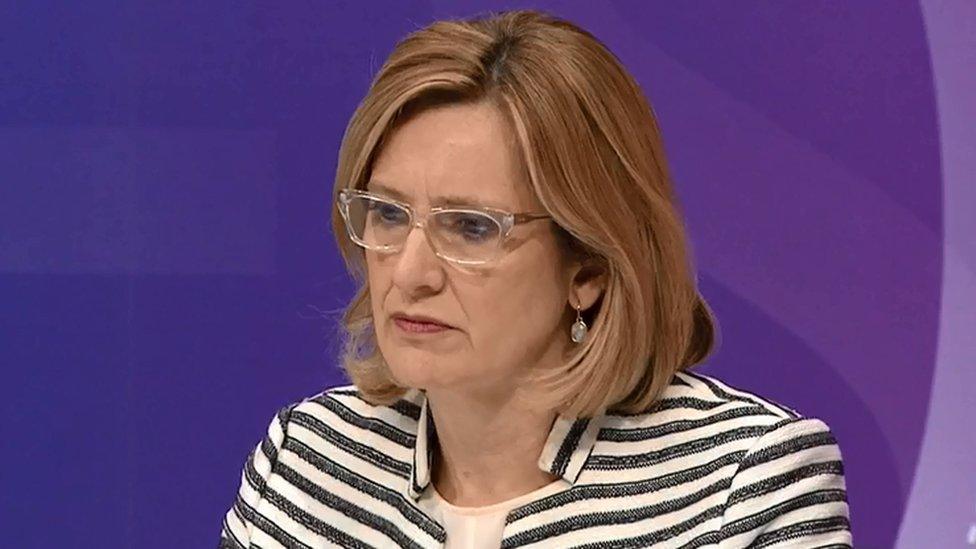Amber Rudd: 'Police cuts not to blame for Manchester'
- Published

Amber Rudd was challenged about police numbers on Question Time
Home Secretary Amber Rudd has denied cuts in police numbers made the Manchester bombing more likely.
A member of the studio audience on BBC's Question Time said Theresa May had been warned of the dangers of cutting in frontline police numbers.
It had undermined the ability to gather intelligence on possible threats, it was claimed.
Ms Rudd said most intelligence came from community leaders rather than the police.
She said: "I have asked the head of counter-terrorism whether this is about resources. It is not.
"We must not imply that this terrorist activity may not have taken place if there had been more policing."
Police numbers have declined by 19,000 in England and Wales since 2010.
As of September 2016, there were 122,859 police officers working in England and Wales.
Up until 2010, spending on policing had been increasing for at least 15 years, rising most sharply between 2000 and 2010 when it went up by around 30%. But since then, spending has come back down significantly.
Although the Conservatives pledged to protect police budgets in real terms in 2015, this came off the back of five years of deep cuts amounting to 18% in real terms.
The home secretary said good counter-terrorism was based on a close relationship between the police and intelligence services.
"That is what we have. That is why the UK has a strong counter-terrorism network.
"It's also about making sure we get in early on radicalisation. But it's not about those pure numbers on the street."
But Andy Burnham, Labour's Greater Manchester's metro mayor, also speaking on Question Time, said a debate was needed about police numbers.
He said: "Neighbourhood policing is the first building block of an effective intelligence system - the eyes and the ears on the ground in those communities feeding information back - and if you allow neighbourhood policing to become too eroded, and there aren't enough police on our streets, then that does become a problem."
Ms Rudd said another key was the Prevent strategy, which works to build links with community groups, not through the police.
She said Prevent had helped stop 150 people - including 50 children - from leaving Britain to fight in Syria in the last year.
Mr Burnham also called for a review of Prevent, which he said had alienated members of Britain's Muslim community, who felt picked on.
Counter-terrorism measures
Speaking on the BBC Radio 4 Today programme, Security Minister Ben Wallace said the government had invested heavily in counter-terrorism measures.
"When you fight terrorism it is not just boots on the ground," he said.
A former independent reviewer of terrorism legislation has criticised the decision to axe control orders to monitor and restrict freedom of movement of people suspected of terrorist activity.
The measure was scrapped in 2012 amid civil liberty concerns, in favour of less restrictive terrorism prevention and investigation measures (TPIMs).
How can police stop terror suspects travelling?
Lord Carlile, an independent peer, told Today the powers "may have saved dozens of lives" between 2005 and 2011.
He said: "It was a grave mistake by the coalition government to remove control orders and to produce something more dilute."
UKIP has said it would beef up security by increasing numbers of police officers, troops and border guards.